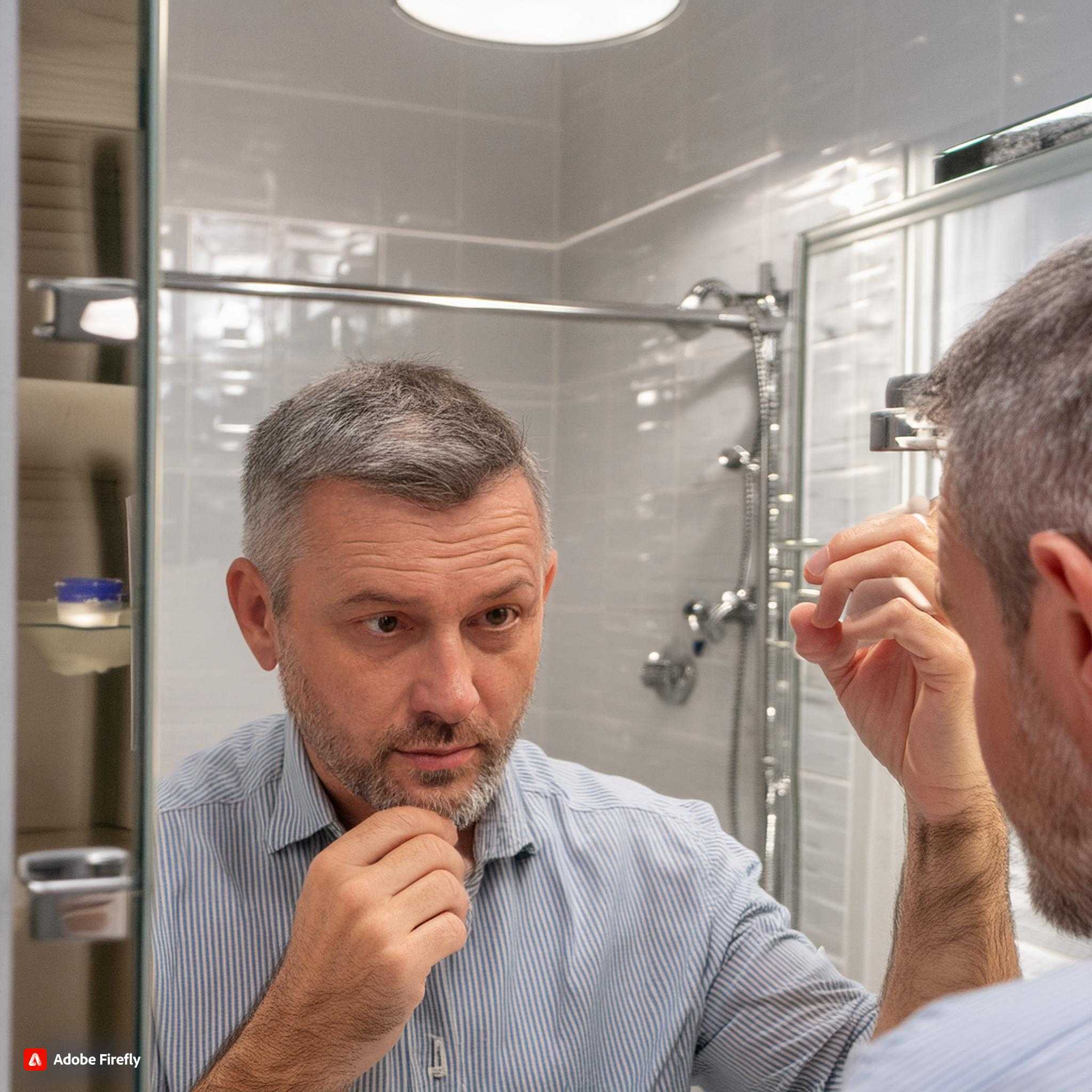
Ethan Carter, MD
Nov 22, 2022
How Age Impacts Hair Loss in Men: Expectations and Preparation



How Age Affects Hair Loss in Men: What to Expect and How to Prepare
As men age, changes in hair health and density are common. While hair loss can be a natural part of aging, understanding what to expect and how to prepare can help manage this transition more effectively. In this blog, we'll explore the impact of aging on hair loss in men and provide practical tips to maintain healthy hair as you grow older.
The Science Behind Age-Related Hair Loss
Hair loss in men, often referred to as androgenetic alopecia or male pattern baldness, is influenced by both genetic and hormonal factors. As men age, the following changes contribute to hair loss:
Hormonal Changes
Androgens: Hormones such as testosterone and its derivative, dihydrotestosterone (DHT), play a significant role. DHT affects hair follicles, causing them to shrink and produce thinner hair over time.
Decrease in Hair Growth Cycles: The anagen (growth) phase of hair follicles shortens with age, leading to shorter, thinner hair strands.
Genetic Predisposition
Family History: Genetics determine how susceptible you are to hair loss. If baldness runs in your family, you are more likely to experience it as you age.
Reduced Hair Follicle Density
Follicle Miniaturization: Over time, hair follicles shrink and produce finer hair until they eventually stop producing hair altogether.
What to Expect with Age-Related Hair Loss
While hair loss can begin at different ages for different men, here are some general expectations based on age:
In Your 20s and 30s
Early Signs: Hairline recession, especially at the temples, and thinning at the crown may begin.
Gradual Progression: Hair loss is usually slow but noticeable over time.
In Your 40s and 50s
Increased Thinning: Hair thinning becomes more pronounced, and the bald spot at the crown may enlarge.
Pattern Baldness: More defined patterns of baldness may emerge, particularly the classic "M" shape at the hairline.
In Your 60s and Beyond
Significant Loss: Most men will experience significant hair loss, with some reaching a near-bald state.
Hair Texture Changes: Remaining hair may become finer and less dense.
How to Prepare and Manage Age-Related Hair Loss
While you can't stop aging, there are several strategies you can adopt to manage hair loss effectively and maintain healthy hair:
Seek Professional Advice
Dermatologist Consultation: Consult a dermatologist or trichologist for an accurate diagnosis and personalized treatment plan.
Regular Check-Ups: Regular visits can help monitor your hair health and adjust treatments as needed.
Adopt a Healthy Hair Care Routine
Gentle Products: Use mild shampoos and conditioners free of harsh chemicals.
Proper Washing Techniques: Avoid over-washing your hair to prevent dryness and breakage.
Consider Medical Treatments
Minoxidil (Rogaine): A topical treatment that stimulates hair growth and slows hair loss.
Finasteride (Propecia): An oral medication that reduces DHT levels, slowing hair loss and promoting regrowth.
New Therapies: Explore advanced treatments like platelet-rich plasma (PRP) therapy or low-level laser therapy (LLLT).
Lifestyle Changes
Balanced Diet: Eat a diet rich in vitamins and minerals essential for hair health, such as biotin, zinc, iron, and vitamins A, C, D, and E.
Stress Management: Reduce stress through regular exercise, meditation, and adequate sleep, as stress can exacerbate hair loss.
Protect Your Hair
Sun Protection: Wear hats or use hair products with UV protection to shield your hair and scalp from sun damage.
Avoid Tight Hairstyles: Styles that pull on the hair can cause traction alopecia, contributing to hair loss.
Embrace and Manage the Aging Process
Aging is a natural part of life, and so is hair loss for many men. By understanding the factors contributing to hair loss and adopting proactive measures, you can manage and mitigate its effects. Embrace the journey with confidence, knowing that with the right approach, you can maintain healthy hair and a positive self-image.
Ready to take control of your hair health? Get your personalized plan on our website today and start your journey towards healthier hair!
How Age Affects Hair Loss in Men: What to Expect and How to Prepare
As men age, changes in hair health and density are common. While hair loss can be a natural part of aging, understanding what to expect and how to prepare can help manage this transition more effectively. In this blog, we'll explore the impact of aging on hair loss in men and provide practical tips to maintain healthy hair as you grow older.
The Science Behind Age-Related Hair Loss
Hair loss in men, often referred to as androgenetic alopecia or male pattern baldness, is influenced by both genetic and hormonal factors. As men age, the following changes contribute to hair loss:
Hormonal Changes
Androgens: Hormones such as testosterone and its derivative, dihydrotestosterone (DHT), play a significant role. DHT affects hair follicles, causing them to shrink and produce thinner hair over time.
Decrease in Hair Growth Cycles: The anagen (growth) phase of hair follicles shortens with age, leading to shorter, thinner hair strands.
Genetic Predisposition
Family History: Genetics determine how susceptible you are to hair loss. If baldness runs in your family, you are more likely to experience it as you age.
Reduced Hair Follicle Density
Follicle Miniaturization: Over time, hair follicles shrink and produce finer hair until they eventually stop producing hair altogether.
What to Expect with Age-Related Hair Loss
While hair loss can begin at different ages for different men, here are some general expectations based on age:
In Your 20s and 30s
Early Signs: Hairline recession, especially at the temples, and thinning at the crown may begin.
Gradual Progression: Hair loss is usually slow but noticeable over time.
In Your 40s and 50s
Increased Thinning: Hair thinning becomes more pronounced, and the bald spot at the crown may enlarge.
Pattern Baldness: More defined patterns of baldness may emerge, particularly the classic "M" shape at the hairline.
In Your 60s and Beyond
Significant Loss: Most men will experience significant hair loss, with some reaching a near-bald state.
Hair Texture Changes: Remaining hair may become finer and less dense.
How to Prepare and Manage Age-Related Hair Loss
While you can't stop aging, there are several strategies you can adopt to manage hair loss effectively and maintain healthy hair:
Seek Professional Advice
Dermatologist Consultation: Consult a dermatologist or trichologist for an accurate diagnosis and personalized treatment plan.
Regular Check-Ups: Regular visits can help monitor your hair health and adjust treatments as needed.
Adopt a Healthy Hair Care Routine
Gentle Products: Use mild shampoos and conditioners free of harsh chemicals.
Proper Washing Techniques: Avoid over-washing your hair to prevent dryness and breakage.
Consider Medical Treatments
Minoxidil (Rogaine): A topical treatment that stimulates hair growth and slows hair loss.
Finasteride (Propecia): An oral medication that reduces DHT levels, slowing hair loss and promoting regrowth.
New Therapies: Explore advanced treatments like platelet-rich plasma (PRP) therapy or low-level laser therapy (LLLT).
Lifestyle Changes
Balanced Diet: Eat a diet rich in vitamins and minerals essential for hair health, such as biotin, zinc, iron, and vitamins A, C, D, and E.
Stress Management: Reduce stress through regular exercise, meditation, and adequate sleep, as stress can exacerbate hair loss.
Protect Your Hair
Sun Protection: Wear hats or use hair products with UV protection to shield your hair and scalp from sun damage.
Avoid Tight Hairstyles: Styles that pull on the hair can cause traction alopecia, contributing to hair loss.
Embrace and Manage the Aging Process
Aging is a natural part of life, and so is hair loss for many men. By understanding the factors contributing to hair loss and adopting proactive measures, you can manage and mitigate its effects. Embrace the journey with confidence, knowing that with the right approach, you can maintain healthy hair and a positive self-image.
Ready to take control of your hair health? Get your personalized plan on our website today and start your journey towards healthier hair!
© 2024 Hairful. All rights reserved.
© 2024 Hairful. All rights reserved.
© 2024 Hairful. All rights reserved.